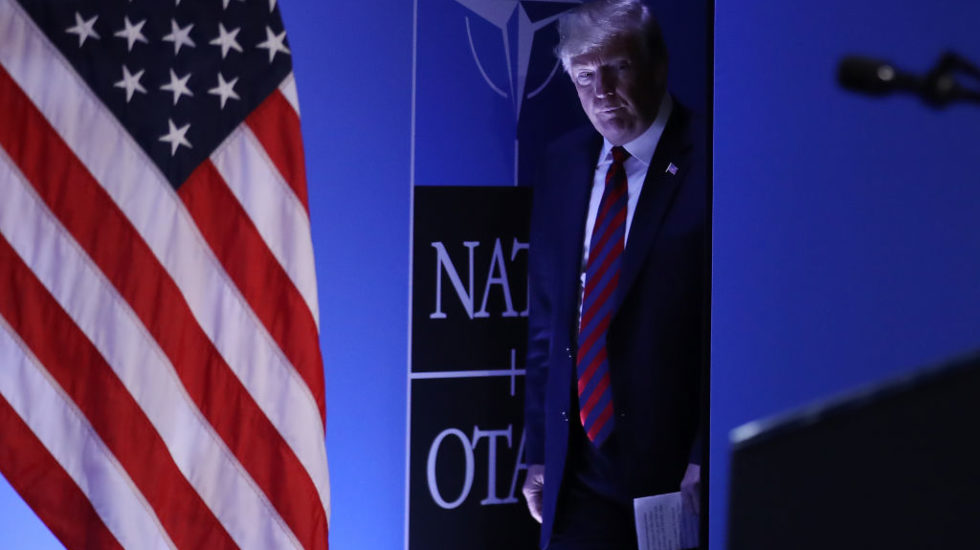Prosecutors have been circling former President Donald Trump for years. The Manhattan District Attorney’s office has recently acquired millions of documents pertaining to his finances, including tax records.
Trump’s confidant Rudy Giuliani is also under investigation. Federal agents searched his apartment late last month.
Both GOP bigwigs have dismissed the inquiries, saying they’re politically motivated, and neither are showing the type of humility you might expect from a marked man.
Trump continues to push the conspiracy theory that he won the 2020 election as he dominates the Republican party from his Mar-a-Lago outpost; Giuliani has insulted the federal prosecutors who are pursuing him.
Such bombast is nothing new from the two self-styled brawlers. But is their confidence inspired by a set of secret ‘get out of jail free’ cards?
In the waning days of the Trump administration, media reports warned that a series of presidential pardons – and perhaps even a self-pardon – were forthcoming. From a January 7th Bloomberg article:
President Donald Trump has prepared a sweeping list of individuals he’s hoping to pardon in the final days of his administration that includes senior White House officials, family members, prominent rappers — and possibly himself, according to people familiar with the matter.
While Trump did pardon former associates like Steve Bannon, Paul Manafort and Roger Stone – in addition to Charles Kushner, a member of Trump’s extended family – the most egregious potential pardons were never publicly issued. Nothing preemptive, for example, to his adult children. And nothing for Giuliani, his longtime personal lawyer.
But some legal experts wonder if Trump may have issued secret pardons that could be used when necessary.
“I would still be shocked if Trump didn’t give Rudy and the Trump fam pardons. (There’s no requirement that pardons be made public or filed in any particular place). Guess we’re going to find out, at least as to Rudy,” reads a April 28th tweet from Ross Garber, a lawyer who’s defended politicians in impeachment hearings and teaches impeachment law at Tulane University.
No president in history has issued a self-pardon or a secret pardon. But neither seems beyond the pale in the realm of Trump’s self-serving behavior. In fact, The New York Times reported that a self-pardon was seriously discussed and Michael Cohen, the lawyer who worked closely with Trump for decades, believes clandestinely issued pardons exist. From a January interview Cohen did with MSNBC:
“I think Donald Trump actually has given himself the pardon. I think he also has pocket pardons for his children and for Rudy [Giuliani] and it’s already stashed somewhere that, if and when they do get indicted and that there’s a criminal conviction, federal criminal conviction brought against him, he already has the pardons in hand.”
In the Watergate era, The Washington Post made a similar observation about Nixon. “The president could present himself with a written pardon during the next months, date it and quietly deposit it in a trust vault — ready to be pulled as a defense or waiver at any subsequent trial,” The Post noted.
But would a secret pardon be legal? It’s unclear.
In a fact check on the topic, Newsweek cites Harvard Law scholar Laurence Tribe:
Tribe said the nature and purpose of pardons implies a public acknowledgment of wrongdoing and forgiveness.
“They were supposed to be accompanied with either a confession of guilt or that they implied that the person who accepts the pardon is willing to publicly admit guilt,” Tribe said. “And the fact that there’s no indication in the discussion of the Constitution when the pardon power, which is already pretty sweeping and subject to abuse, could be hidden behind a veil of secrecy, I would argue that it’s validity is up in the air.”
Jeffrey Crouch, an assistant professor of American politics at American University, makes a similar argument in The Washington Post:
The notion of a secret pardon is an oxymoron. The very concept of a pardon is that it is a public act, granting mercy to the recipient. An ordinary pardon would have no force or meaning if it were kept secret. Moreover, a pardon kept from public view would frustrate an essential element of the otherwise absolute pardon power: public accountability through political consequences. Without knowledge of a president’s pardoning decisions, neither Congress nor the public may effectively check their clemency actions.
The courts would ultimately decide the issue. If the pardons were revealed before the 2024 election – in which Trump is all but assured to run – voters may have something to say on the topic, too.



